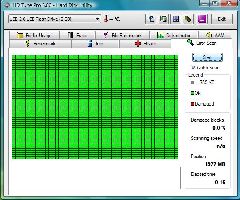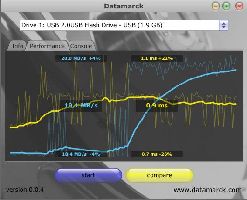|
A-DATA Disney Theme Series T703 Flash Drive
Testing
In order to get an accurate reading on the read/write speeds of the flash drive, it is necessary to test it against more than one type of benchmark. For the A-DATA T703 Flash Drive, I decided to run the following tests: HD TUNE ERROR SCAN, Crystal DiskMark, HD Tune, and Datamarck.
HD Tune Error Scan
The first test that was run was the HD TUNE SCAN, this test determines if there any errors on the flash drive that will cause it to not work correctly.
(Click to Enlarge)
Using the legend as a guide, you can see that the T703 contains no damaged blocks and therefore no errors. Mickey Mouse passes this test! Next the flash drive was run against Crystal DiskMark.
Crystal DiskMark
Crystal DiskMark is a very effective benchmark in measuring the read/write speeds of the flash drive for different file sizes. Crystal DiskMark builds 50MB, 100MB, 500MB AND 1000MB files and tests the read/write speed six different times. The read speed is tested three times (left column) and the write speed (right column) is tested three times. Each read/run test is run five times for each file size, and the averages are shown below.
(Click to Enlarge)
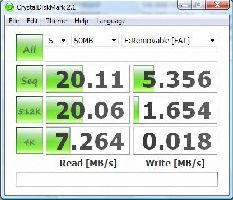 |
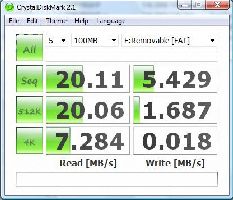 |
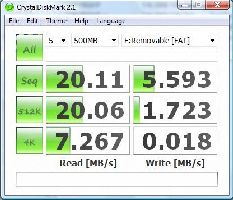 |
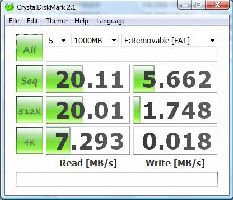 |
After comparing the read speeds for all four tests, it can be concluded that the T703 is one very consistent flash drive. It was able to read the smallest 50MB file at the exact same 20.11 MB/s rate as the 1000MB file. Compared to other flash drives, a read speed of 20.11 MB/s is average, especially for a 2GB drive. As far as write speed, the T703 also performed about average. A typical write speed is anywhere from 4 MB/s to 8MB/s .
HD TUNE
HD Tune is a benchmark that tests the transfer rate of information from the flash drive to your computer.
(Click to Enlarge)
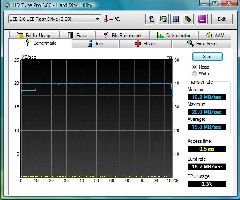 |
Again, the Mickey Flash drive performed very well, and showed great consistency. This test, however, shows that the average transfer or read speed is 19.8 MB/s, that is .3 less than the 20.11 MB/s that the Crystal DiskMark test showed. The .3 difference is almost irrelevant when talking about consistency. The HD Tune benchmark also tests how much of your CPU the flash drive takes up. As you can see on the bottom right hand corner of the image the CPU usage is extremely low at .3%. A low amount of CPU Usage is beneficial because it will not slow down the other processes on your computer when it is in use.
Datamarck
The final benchmark ran was Datamarck. Datamarck is used to test the read speed and access time of the flash drive. The access time is the amount of time it takes for your computer to open a file once the flash drive has been inserted in the USB drive on your computer.
(Click to Enlarge)
With each benchmark that is run the amount of MB/s that can be read consistency decines. With this test we see that the average amount of MB/s is 19.1. That is a whole 1MB slower than the Crystal DiskMark benchmark. The average access speed of the Mickey Mouse drive is .9 ms. The higher the access time, obviously the longer it takes to open the data onto your computer. Therefore, compared to other flash drives that have an access speed of 1.3 ms or more, the Mickey Mouse drive has a pretty decent access speed.
Overall the A-DATA Mickey Mouse flash drive performed pretty well. It performed extremely consistent on both the Crystal DiskMark and HD Tune Benchmarks and was error free when tested by the HD Error Scan.






